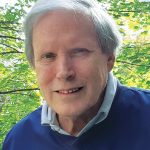Climate Change & Clean Energy

From the Editor / L. Ian MacDonald
Welcome to our special issue, Climate Change & Clean Energy, a timely update and look ahead following COP26. If there’s one thing delegates and observers from nearly 200 countries agreed on at Glasgow, it was that global warming is no longer a hypothetical conversation about dire developments in the future.
Climate change is occurring in the here and now, and the question is how the world achieves “net zero” to mitigate the consequences for humanity, in economic and social terms, to say nothing of the costs of recovery.
First, we present analyses of the issues, from the urgency of climate change in global terms to some of the specifics such as the firestorms and floods that have devastated British Columbia and other regions of Canada. Then, on to clean energy, from renewables to innovations and technology upgrades, and the positive involvement of Canadian corporate, industrial and financial leaders.
One effect of climate change, forget about the FISC as we’ve known it, advises Kevin Page, President of the Institute for Fiscal Studies and Democracy at University of Ottawa. Page and economics student Alexandra Ducharme offer a sense, as he says, “of what the fiscal planning framework might look like in a net zero economy.”
Climate change consultant Dan Woynillowicz notes “the ‘new normal’ is that there is no normal anymore.” But he remains one of the “stubborn optimists” that Canada can make significant progress on meeting its new goals of emission reductions.
As former Privy Council Clerk Kevin Lynch and onetime White House aide Paul Deegan observe, “governments will need to provide the incentives and supportive regulatory environment to hasten the private sector’s adjustment”.
For our lead foreign affairs writer Jeremy Kinsman, Glasgow was an important wakeup call to the world. “It’s the ultimate stress test,” he writes, “of the abilities of the world’s nations and peoples to work together in our collective defence and existential interest.” Robin Sears writes of the politics of climate change in Canada, at both the federal and provincial levels. In coming elections, he predicts “the victors will be those who have delivered believable visions of a sustainable Canada.”
Velma McColl was at COP and writes that, “we began to see the silhouette of collective leadership that would implement a shift toward the future.” Elizabeth May was also in Glasgow, the 12th COP conference she’s attended since the first one in Berlin in 1995. But the former Green leader also served in the Mulroney government’s environment ministry at a time when Canada played a leading role, “from acid rain to the ozone layer, from the Montreal Protocol in 1987 to the Rio Summit in 1992,” where Canada was an early advocate of sustainable development. The time for Canadian leadership is back, she concludes.
On a solutions agenda, RBC Senior VP John Stackhouse writes that “we need a new playbook, for finance, policy and regulation.”
Former Calgary MP Lee Richardson, who previously was chief of staff to the legendary Premier Peter Lougheed, sees Alberta playing a positive role in the transition to a green energy economy. He writes: “Alberta may be Canada’s largest generator of carbon emissions, but it may also be a key to Canada’s net zero solution.”
John Delacourt offers some thoughts on government and business engaging effectively in a post-Glasgow public policy environment.Canadian Nuclear Association President John Gorman attended COP and concludes: “Governments around the world must look beyond election cycles to the 30-year imperative of net zero.”
Derek Nighbor and Kate Lindsay of the Forest Products Association of Canada, note that Canada, with only 0.5 percent of global population, is home to 9 percent of the world’s forests. And forests absorb 2.6 billion tonnes of CO2 per year, one-third of all released annually from fossils fuels.
In Book Reviews, we’re delighted to offer a variety of must-reads.
First, Anthony Wilson-Smith weighs in with a positive appraisal of former Chief Justice Beverley McLachlin’s new novel, Denial, in a courthouse setting.
Then NDP rock critic Charlie Angus offers a compelling review of The Lyrics, Paul McCartney’s account of how the Beatles got their start and why, all these years later, they’re still the best, “fresh and ageless”.
Colin Robertson looks at Chinese hostage diplomacy in The Two Michaels, an important analysis by Mike Blanchfield and Fen Osler Hampson of the three years Canadians Michael Kovrig and Michael Spavor spent imprisoned by the Beijing dictatorship.
And Habs fan Paul Deegan considers Inexact Science, by the father-son team of Evan and Bruce Dowbiggin, on how NHL general managers trade for draft picks.
Finally, columnist Don Newman looks at the first weeks of the new Parliament, and writes that a minority House raises the possibility of succession in the leadership of both the Liberal and Conservative parties.
Enjoy.
